Resources
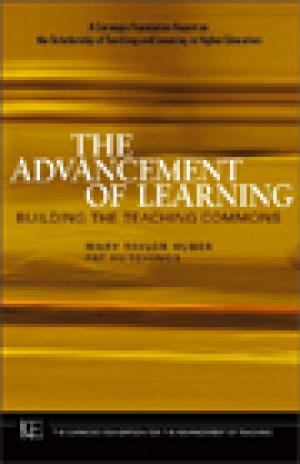
A publication of The Carnegie Foundation for the Advancement of Teaching, this important resource builds on the work of Carnegie's best-selling books, Scholarship Reconsidered and Scholarship Assessed. The Advancement of Learning explores the premise that the scholarship of teaching and learning holds the key to improving the quality of higher education. The Advancement of Learning answers questions readers are likely to have: What are the defining elements of the scholarship of teaching and learning? What traditions does it build on? What are its distinctive claims and possibilities? What are the implications of the scholarship of teaching and learning for academic culture and careers? How does it shape the student experience?In addition, authors Mary Taylor Huber and Pat Hutchings introduce a new concept that expands on the scholarship of teaching and learning - the teaching commons. As the authors explain, the teaching commons is a conceptual space in which communities of educators committed to inquiry and innovation come together to exchange ideas about teaching and learning and use them to meet the challenges of educating students for personal, professional, and civic life. (From the Publisher)
The Wabash Center for Teaching and Learning was established in the wake of heightened interest in teaching and learning following Ernest L. Boyer's 1990 Carnegie Foundation report on the professoriate. The Center was established specifically to strengthen teaching and learning in theology and religion. The praxis of Wabash Center programs directed to that quest, however, inevitably engaged participants in the scholarship of teaching and learning by highlighting questions from their teaching practice, the disciplinary shape of their teaching, and the influence of multiple publics on what and how they taught.
This article argues that the primary intellectual embodiment of the Wabash Center's ethos of hospitality is a particular kind of reflection on teaching and learning, "midrange reflection." It defines and describes midrange reflection and then discusses the two essential skills required to facilitate it as distinct from other types of reflection and discussion: (1) the ability to identify issues in the life of a learning community, and (2) the ability to design sequences of questions and intellectual activities that promote reflection on those issues. As the underlying, if not defining practice of Wabash Center workshops, colloquies, and consultations, midrange reflection is crucial to the significant learning that occurs in Wabash Center programs and to participants’ ability to take their deeper understanding and insights back into their classrooms and professional lives.
The article is a reflection on what I perceive to be a confusion about the relation between theoretical judgments and judgments of pedagogical efficacy. My interest in the issue originated with my own confusion over persistent student resistance to certain assigned texts that I had initially felt confident would prove valuable in the classroom. The essay unfolds in three segments. In the first, I recount how this concern about the relation between theoretical judgments and judgments of pedagogical efficacy evolved out of my own teaching. I next list three tentative conclusions about the correlation or lack of correlation between theoretical judgments and judgments of pedagogical efficacy. In the concluding segment, I call for concerted resistance to the tendency of pure rationality to colonize the aesthetic and dramatic components of experience so essential to transformative teaching and learning.
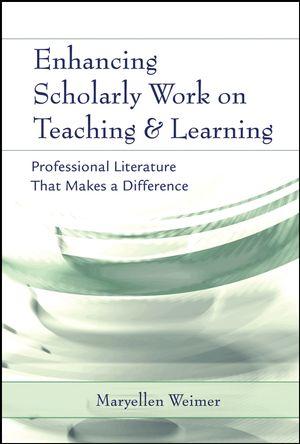
Mapping the Territory of Teaching offers a review of the most current and important writings on the topic of scholarship of teaching and learning in higher education. One of the foremost experts in the field, Editor Maryellen Weimer is uniquely qualified to bring this information together. (From the Publisher)
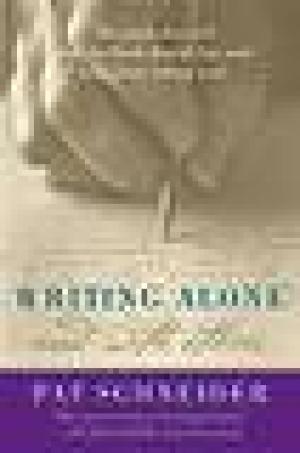
For more than a quarter of a century, Pat Schneider has helped writers find and liberate their true voices. She has taught all kinds -- the award winning, the struggling, and those who have been silenced by poverty and hardship. Her innovative methods have worked in classrooms from elementary to graduate level, in jail cells and public housing projects, in convents and seminaries, in youth at-risk programs, and with groups of the terminally ill. Now, in Writing Alone and with Others, Schneider's acclaimed methods are available in a single, well-organized, and highly readable volume. The first part of the book guides the reader through the perils of the solitary writing life: fear, writer's block, and the bad habits of the internal critic. In the second section, Schneider describes the Amherst Writers and Artists workshop method, widely used across the U.S. and abroad. Chapters on fiction and poetry address matters of technique and point to further resources, while more than a hundred writing exercises offer specific ways to jumpstart the blocked and stretch the rut-stuck. Schneider's innovative teaching method will refresh the experienced writer and encourage the beginner. Her book is the essential owner's manual for the writer's voice. (From the Publisher)
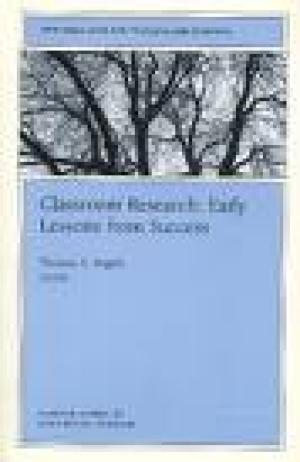
Since 1986, when K. Patricia Cross first began to write and speak about Classroom Research, faculty across the country have been inspired by her vision of a learner-centered, teaching-directed approach aimed at understanding and improving student learning. In the intervening five years, hundreds of college teachers at dozens of institutions have taken up her challenge to become "Classroom Researchers," engaging in the systematic and ongoing study of teaching and learning. This volume of New Directions for Teaching and Learning is a collection of examples illustrating a range of ways Classroom Research can be used in a variety of disciplines and settings. It is a gathering of teachers' stories that are also teaching stories, narratives that distill hundreds of hours of experience into a few pages. Whether they are faculty, faculty developers, or academic administrators, readers can profit by learning from the hard-won experience and insights distilled in these early lessons from success. This is the 46th issue of the quarterly journal New Directions for Teaching and Learning. (From the Publisher)
Engineering professors, like professors in every field, have always experimented with innovative instructional methods, but traditionally little was done to link the innovations to learning theories or to evaluate them beyond anecdotal reports of student satisfaction. More scholarly approaches have become common in the past two decades as a consequence of several developments, including a change in the engineering program accreditation system to one requiring learning outcomes assessment and continual improvement, and the literature of the scholarship of teaching and learning in engineering has grown rapidly. Most published studies have used surveys and quantitative research methods, approaches with which engineers tend to be relatively comfortable, but studies that use some of the qualitative methods characteristic of social science research have also begun to appear. The challenge to engineering education is to make the scholarship of teaching and learning equal to the scholarships of discovery, integration, and application in the faculty reward system.
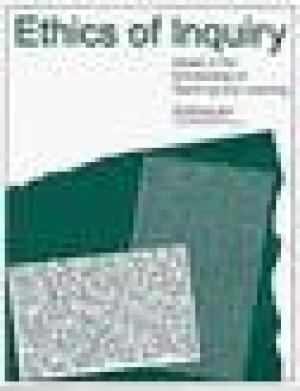
Intended as a resource to assist faculty and campuses in thinking carefully about ethical dimensions of the scholarship of teaching and learning, Ethics of Inquiry provides an overview of the issues, sets the context and offers multiple perspectives from which to view these issues. The volume includes seven case studies by scholars of teaching and learning reflecting on ethical dimensions and dilemmas in their work. Each case is followed by three commentaries by respondents, including students, with diverse points of view. (From the Publisher)